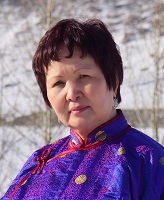The Tuvan legend ‘Bogda Changar Khan’ and its constant segments in the Oirat and Kalmyk versions of the heroic epic of ‘Jangar’
DOI:
https://doi.org/10.25178/nit.2019.4.9Keywords:
epic; Tuvans; Oirats; Kalmyks; ethno-poetic constants; Jangar; Bogda Changar Khan; Tuvan folklore; Kalmyk folkloreAbstract
The article analyzes levels and grades of affinity between the Tuvan legend ‘Bogda Changar-khaan”, recorded from the taleteller Bayan U. Balbyr (1881–1962), and the Oirat and Kalmyk version of the heroic epic of ‘Jangar’. The text of the Tuvan legend is stored in the Tuvan Institute for Humanities and Applied Socio-Economic Research, the considered text of the Kalmyk epic is that of the 1978 edition – ‘Jangar. The Kalmyk Heroic Epic’.
The paper examines plot components characterized by varied constancy within the epic narrative. The study is based on the theory of ethno-poetic constants by V. M. Gatsak and other scientific methods. Special attention is paid to motifs and formulas typical for epics of Mongolic peoples both structurally, semantically, and verbally. The study deals with ethno-poetic constants of various levels: the plot about heroic actions; motifs: the message about the enemy’s arrival, selection of a hero, departure of the latter, punishment of the aggressor, etc.
It is noted that the Tuvan legend emerged as a result of the taleteller’s creative work who had been familiar with the Oirat epic tradition and was able to adapt the ‘imported’ plot within the Tuvan folklore environment, retaining some important epic constant segmentsReferences
Aman zokhiol sudlal [Investigating folklore] (1978). Comp. by Y. Zagdsuren. Ulaanbataar, Mong. Acad. of Sc. 234 p. (In Mong.)
Gatsak, V. M. (2000a) Severnye etnopoeticheskie konstanty [Northern ethno-poetic constants]. Severnyi (Arkticheskii) Federal'nyi universitet [online] Available at: https://narfu.ru/upload/iblock/988/gatsak-v.m.-severnye-etnopoeticheskie-konstanty-.pdf (access date: 05.07.2019). (In Russ.).
Gatsak, V. M. (2000b) Fol'klor — pamiat' traditsii: urovni i formy etnopoeticheskoi konstantnosti [Folklore — the memory of tradition: levels and forms of ethno-poetic constancy]. Vestnik DNTs RAN, no. 8, pp. 94–103. (In Russ.).
Gatsak, V. M. (2002) Etnopoeticheskie konstanty v fol'klore: urovni, izoglossy, «mul'timediinye formy» (na slavianskom i neslavianskom materiale) [Ethnopoietic constants in folklore: levels, isoglosses, ‘multimedia forms’ (a case study of Slavic and non-Slavic language materials)]. In: Literatura, kul'tura i fol'klor slavianskikh narodov [Literature, culture and folklore of Slavic peoples]. 13th International Congress of Slavists (Ljubljana, August 2003), reports of Russian scientists / ed. by L. I. Sazonova. Moscow, Gorky Institute of World Literature (IMLI). 435 p. Pp. 313–314. (In Russ.).
Grebnev, L. V. (1960) Tuvinskii geroicheskii epos (opyt istoriko-etnograficheskogo analiza) [Tuvan heroic epos (experience of historical and ethnographic analysis)]. Moscow, Vost. Lit. 145 p. (In Russ.).
Dzhangar. Kalmytskii geroicheskii epos [Jangar. The Kalmyk heroic epic] (1978a). Texts of 25 songs in 2 vols. Comp. by A. Sh. Kichikov. Moscow, Nauka, GRVL. Vol. 1. 441 p. (In Russ.).
Dzhangar. Kalmytskii geroicheskii epos [The Jangar. Kalmyk heroic epic] (1978b). Texts of 25 songs in 2 vols. Comp. by A. Sh. Kichikov. Moscow, Nauka, GRVL. Vol. 2. 411 p. (In Russ.).
Zhirmunsky, V. M. (1974) Tyurkskii geroicheskii epos [Turkic heroic epic]. Leningrad, Nauka. 720 p. (In Russ.).
Zagdsuren, U. (1978) Preface. In: Aman zokhiol sudlal [Investigating folklore]. Ulaanbaatar, Mong. Acad. of Sc. 234 p. Pp. 3–58. (In Mong.).
Kichikov, A. Sh. (1973) O tuvinskoi bogatyrskoi skazke «Bogda Changgar-khaan» [About the Tuvan heroic tale ‘Bogda Chagar-Khan’]. Uchenye zapiski. Vol. XI. Elista, KNIIYaLI. 238 p. Pp. 118–121. (In Russ.).
Korogly, Kh. G. (1975) Oguzskii epos (Sravnitel'nyi analiz) [Oguz epic: (Comparative analysis)]. In: Tipologiia narodnogo eposa [Typology of the folk epic]. Ed. by V. M. Gatsak. Moscow, Nauka. 326 p. Pp. 64–81. (In Russ.).
Kungaa, M. B. (2019) Tuvinskie fol'klornye siuzhety, voskhodiashchie k «Dzhangaru» [Tuvan folklore stories tracing their origin to the Jangar]. In: “Delkhiin tuul' ba «Zhangar»” [Epics of the world and the Jangar]. International symposium. 2018. Ed. by B. Katuu and G. Batmönkh. Ulaanbaatar, Soembo Printing. 312 p. Pp. 120 –123. (In Russ.).
Kuular, D. S. (1973) Bogda Changgar khan (Tuvinskii epos) [Bogda Changgar khan (a Tuvan epic)]. In: Uchenye zapiski. Vol. XI. Elista, KNIIYaLI. 238 p. Pp. 122–129. (In Russ.).
Kuular, D. S. (2004) Tuvinskaia versiia «Dzhangara» [A Tuvan version of the Jangar]. In: Dzhangar» i problemy epicheskogo tvorchestva [The Jangar and problems of epic creativity]. Proceedings of the International scientific conference, 22-24 August 1990 / ed. by N. Ts. Bitkeev and E. B. Ovalov. Elista, Dzhangar. 601 p. Pp. 143–148. (In Russ.).
Lord, A. B. (1994) Skazitel' [The Taleteller]. Transl. from Engl. and comm. by Yu. A. Kleiner and G. A. Levinton. Moscow, Vost. Lit. 368 p. (In Russ.).
Meletinsky, E. M. (1963) Proiskhozhdenie geroicheskogo eposa [Origins of the heroic epic]. Moscow, Vost. Lit. 459 p. (In Russ.).
Orus-ool, S. M. (2001) Tuvinskie geroicheskie skazaniia (tekstologiia, poetika, stil') [Tuvan heroic legends (textology, poetics, style)]. Moscow, MAKS Press. 422 p. (In Russ.).
Putilov, B. N. (1997) Epicheskoe skazitel'stvo: Tipologiia i etnicheskaia spetsifika [Epic narration: typology and ethnic specificity]. Moscow, Vost. Lit. 295 p. (In Russ.).
Pukhov, I. V. (1975) Geroicheskii epos tiurko-mongol'skikh narodov Sibiri: obshchnost', skhodstvo, razlichiia [Heroic epic of Siberian Turko-Mongols: commonness, similarities, differences]. In: Tipologiia narodnogo eposa [Typology of the folk epic]. Ed. by V. M. Gatsak. Moscow, Nauka. 326 p. Pp. 12–63. (In Russ.).
Surazakov, S. S. (1985) Altaiskii geroicheskii epos [The Altaian heroic epic]. Moscow, Nauka. 256 p. (In Russ.).
Ubushieva, D. V. and Damrinzhav, B. (2019) Matrimonial'nye kollizii v kalmyckom epose «Dzhangar» i skazaniyah tyurko-mongol'skih narodov Sibiri [Matrimonial Collisions in the Kalmyk Epic of Jangar and Legends of Siberia’s Turko-Mongols]. Oriental Studies, no. 44(4), pp. 707–715. DOI: 10.22162/2619-0990-2019-44-4-707-715 (In Russ.).
Khabunova, E. E. (2006) Geroicheskii epos «Dzhangar»: poeticheskie konstanty bogatyrskogo zhiznennogo tsikla (sravnitel'noe izuchenie natsional'nykh versii) [The heroic epic of Jangar: poetic constants of the heroic life cycle (a comparative study of national versions)]. Rostov-on-Don, North Caucasus Scientif. Center. 256 p. (In Russ.).
Reichl, K. (1992) Turkic Oral Epic Poetry: Traditions, Forms, Poetic Structure. New York & London, Garland Publishing, Inc. 395 p.
Published
How to Cite
Khabunova E. E., Dampilova L. S., Kungaa M. B. and Ayuushzhaviyin A. The Tuvan legend ‘Bogda Changar Khan’ and its constant segments in the Oirat and Kalmyk versions of the heroic epic of ‘Jangar’. The New Research of Tuva. 2019, no. 4. URL: https://nit.tuva.asia/nit/article/view/887 (access date ... ). DOI: 10.25178/nit.2019.4.9
Issue
Section

Author(s) license holder(s) grant rights for their work to the journal (grantee of a license) under the simple non-exclusive open license in accordance with Art. 1286.1 «Open license for a research work, work of literature or fine arts», Civil Code of the Russian Federation.
New Research of Tuva publishes articles under the Creative Commons Attribution-NonCommercial license (CC BY-NC).
Since it is an open license, author(s) reserve the right to upload the article to their institutional repository, submit it to another journal (if it allows republications), or republish it on their own website (in full, or in part).
However, several conditions apply here:
a) The republished version must always contain the name(s) and affiliation(s) of the author(s), the original title and the hyperlink to the original version on the New Research of Tuva website;
b) It must be in open access, free of charge, and no category of readers must be in any way whatsoever advantaged over general readership.
c) should the contribution be submitted elsewhere by its author(s) without substantial modification (30% or more of original text unchanged), the body of the article should contain a disclaimer that the original version was published in New Research of Tuva (with a link to the respective page)
The CC-BY-NC is a non-revocable license which applies worldwide and lasts for the duration of the work’s copyright.












